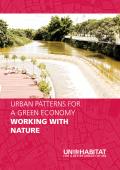By analysing both the risks and potential benefits of China’s shift to a low carbon economy and society, this Human Development Report hopes to contribute to China’s rapidly evolving policies in this area. It highlights that, if China can fully grasp the opportunities at hand, it could move to a society which is not only environmentally sustainable, but which also creates the conditions for greater job creation, enhanced resource efficiency and energy security, better food security and health outcomes for the people. The report points out that the benefits of China’s rapid growth have not come without some serious costs, including damages to the country’s environment and natural resources. Climate change adds new complexities to China’s quest for sustainable and equitable development. The report urges China to work on two fronts: it must deal with the existing and inevitable effects of climate change, and lower the growth of greenhouse gas emissions to prevent even greater threats.
This summary was prepared by Eldis.
Part of a series of four entitled Urban Patterns for a Green Economy, this guide argues that strategic investment in physical infrastructure with the diversification of economies allows cities to play a specialised role in polycentric urban development. Furthermore, it suggests that green economic development can be achieved through the development of green clusters and green jobs. Finally, this guide argues that a number of green economy outcomes may be reached through efficiencies and shared infrastructure, rather than duplication.
The guide contains case studies from Barcelona, Newcastle, Gauteng, Delhi, Zurich, Dezhou, Randstad, and Kitakyushu.
Recognising the importance of the financial sector’s incorporation in the transformation process towards green economies, GIZ Financial Systems Development has introduced new advisory services for policymakers and financial intermediaries in the recent past, and has developed specific products and instruments to smooth the way for green growth and suitable climate change adaptation. Current activities focus on the promotion of green financial sector regulation, the build-up of capacities in financial institutions as well as the introduction of innovative financing concepts to increase the flow of funds into green investments, and the development of weather and agricultural insurance solutions.
This paper offers a snapshot of GIZ’s activities. The paper includes case studies from Tajikistan and Ghana.

Part of a series of four entitled Urban Patterns for a Green Economy, this guide (Working with Nature) focuses on the effect of unplanned, rapid growth of cities on the functioning of a city-region's natural systems. It outlines how guided development can maximise the ability of ecosystems to support sustainable human and natural processes. It offers a perspective on how to work with nature and the ecological processes in regions, and looks at the need to work across scales; to understand regional systems; and develop principles and measures that can be applied at the regional, city and local scales.
This guide includes case studies from Dar es Salaam City, New York City, Seoul, Hangzhou, Berlin, Cape Town, Nueva Vizcaya, and Zagreb.
